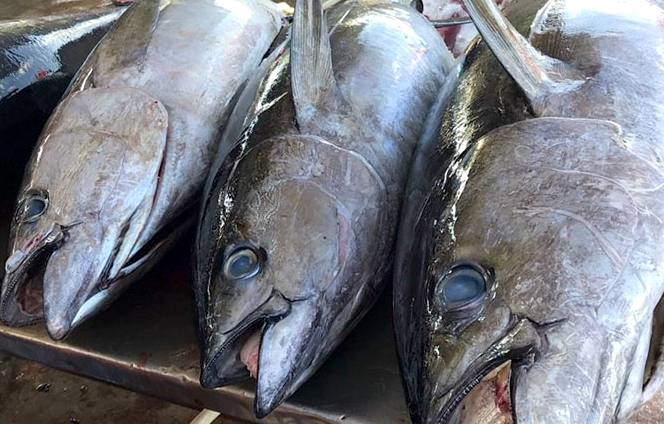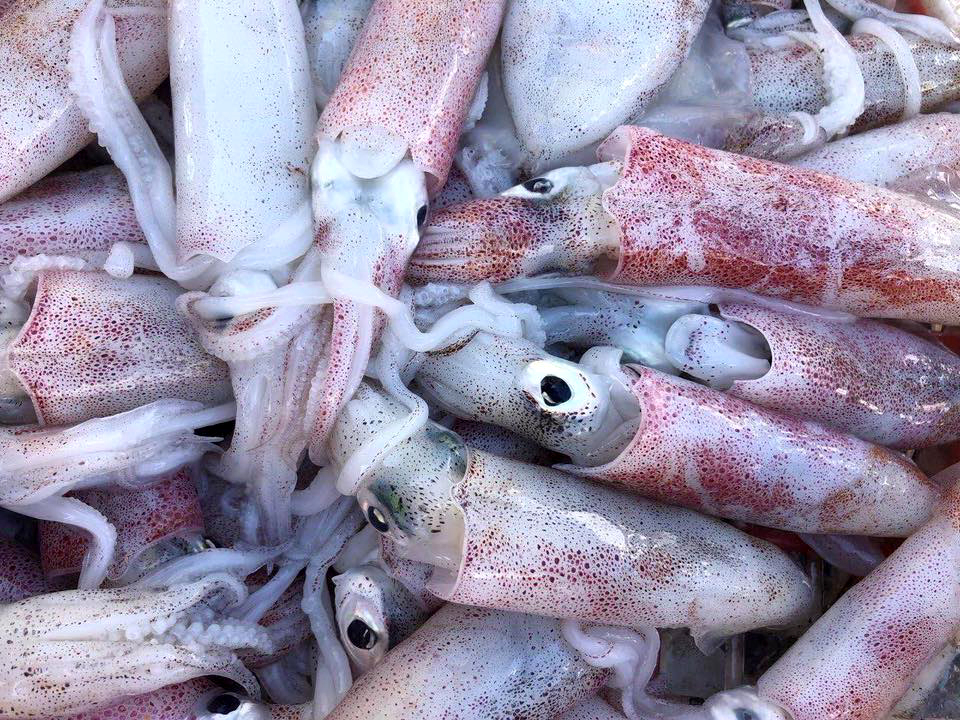November 26, 2025 | 04:39 GMT +7
November 26, 2025 | 04:39 GMT +7
Hotline: 0913.378.918
November 26, 2025 | 04:39 GMT +7
Hotline: 0913.378.918

Export of Vietnamese tuna to Israel is experiencing strong growth. Photo: Son Trang.
Among the Vietnamese seafood products exported to Israel, tuna holds the largest value. According to the Vietnam Association of Seafood Exporters and Producers (VASEP), in 2022, tuna exports to Israel reached 37 million USD. With this trade volume, Israel ranked as the fourth largest market for Vietnamese tuna in the past year.
During the year of 2023, while Vietnamese tuna exports have decreased significantly due to global inflation and economic challenges, exports to Israel have consistently shown high growth rates, with some months even reaching triple-digit growth. In the first six months of 2023, Vietnamese tuna exports to Israel reached nearly 25 million USD, a 92% increase compared to the same period last year. With such growth, Israel is now Vietnam's second-largest single market for tuna imports after the United States.
Many Vietnamese tuna products exported to Israel have shown remarkable growth over the past 7 months, such as frozen tuna loin/meat increasing by 29%, canned tuna rising by 375%, and other processed tuna products growing by 83%...
Amidst strong competition in the Israeli market from tuna produced by Thailand and China, the robust growth of Vietnamese tuna exports to Israel, as mentioned above, underscores the position and potential of Vietnamese tuna in this market. Statistics from the International Trade Center indicate that in the Israeli market, the market share of Vietnamese tuna is currently second only to Thai tuna.
VASEP suggests that in the context of decreasing tuna exports to traditional major markets, Israel is a potential substitute market. This is due to Israel's purchasing power and high payment capacity. Moreover, Israel lacks natural resources and faces limitations in domestic labor force, yet its consumption demand is substantial despite its small size. Therefore, this market still offers room for effective exploitation by Vietnamese tuna enterprises, especially with the enactment of the Vietnam-Israel Free Trade Agreement (VIFTA).
Not only tuna, but Israel is also a highly promising market for Vietnamese seafood. Annually, Israel ranks among the top 22 leading markets out of more than 100 seafood export markets for Vietnam, and it is a significant market for some key seafood products.

Israel is one of the biggest markets for Vietnamese squid and octopus. Photo: Son Trang.
In 2022, Vietnam's seafood exports to Israel reached 80.4 million USD. Among these, Israel ranked 4th among the largest tuna import markets of Vietnam (after the United States, Canada, and Japan); it ranked 8th in importing squid and octopus; and stood 20th in importing frozen shrimp.
During the first 7 months of this year, while Vietnam's seafood exports decreased significantly, exports to the Israeli market continued to display good growth, reaching 47 million USD (an increase of 27% compared to the same period in 2022).
According to Mr. Truong Dinh Hoe, the General Secretary of VASEP, in the current export structure of the seafood industry, the Israeli market holds a relatively modest proportion. However, Vietnamese seafood products in Israel have gained stable footing and are favored and highly regarded by local consumers. Therefore, the VIFTA will provide significant advantages for seafood exporters, giving them time to prepare and a competitive edge over competitors who do not have a Free Trade Agreement with this country. Additionally, VIFTA opens up opportunities for cooperation with the potential-rich Middle East region through the gateway of the United Arab Emirates (UAE).
Moreover, the implementation of the VIFTA brings forth an additional dimension to Vietnam's seafood export strategy. By forging a preferential trading relationship with Israel, Vietnamese exporters gain a competitive edge over those who lack a Free Trade Agreement with this nation. This advantage doesn't just manifest in terms of tariff reductions or elimination; it extends to fostering stronger trade relations, enabling smoother business transactions, and creating an environment conducive to long-term growth.
In essence, the combination of Vietnamese seafood's well-received presence in Israel and the comprehensive benefits that the VIFTA introduces sets the stage for a dynamic expansion of the sector. As Vietnamese exporters capitalize on the agreement's provisions, they not only secure a strong foothold in Israel but also extend their reach into a broader realm of opportunities within the Middle East and beyond.
Translated by Nguyen Hai Long

(VAN) An Giang promotes supply-demand connections, standardizes quality and builds value chains, creating a foundation for sustainable bird’s nest development and aiming to expand exports.
/2025/11/24/5339-4-nongnghiep-075331.jpg)
(VAN) Recently, the conference on 'Sustainable Fisheries Linkage Chain - Tilapia for Export' took place in Tien Hai commune, Hung Yen province.
/2025/11/21/4309-2-153400_128.jpg)
(VAN) Green and low-emission rice is paving the way for Vietnamese rice to enter high-end markets, marking the beginning of a transformation journey toward greening and elevating the national rice brand.

(VAN) ‘Right to Win’ outlines a national action plan that shapes a new vision for Viet Nam’s agriculture in an era of renewal and global integration.

(VAN) Lam Dong’s farmed sturgeon output this year is expected to reach 2,300 tons, worth VND 450 billion, affirming the brand’s position on the market.

(VAN) A surge in Ukrainian egg exports, largely driven by soaring sales to the UK over the last few years, has notably pushed up egg prices on the domestic market.

(VAN) The price of Arabica Catimor coffee in Quang Tri is currently at VND 25,000–27,000/kg (fresh cherries), the highest level ever recorded